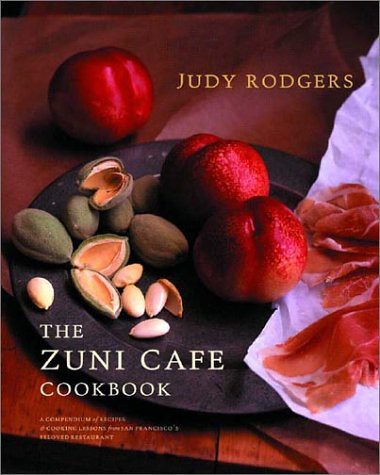 The Zuni Cafe is practically an institute in San Francisco. It receives rave reviews from all who enter it's warming foyer, and delight in their ever changing, seasonal menu. From this of course, what proud home chef, foodie, and restauranteur would not seek to obtain a copy of The Zuni Cafe Cookbook? A tome of gustatory knowledge and worth.
The Zuni Cafe is practically an institute in San Francisco. It receives rave reviews from all who enter it's warming foyer, and delight in their ever changing, seasonal menu. From this of course, what proud home chef, foodie, and restauranteur would not seek to obtain a copy of The Zuni Cafe Cookbook? A tome of gustatory knowledge and worth.Winner of the James Beard Cookbook of the Award, it has been lauded as one of the best cookbooks to ever come forth in a long time. In many respects, I have to fully agree. Judy Rodgers does an excellent job of not just making this a simple cookbook, but a novel, an educational course, a book to take to lay out on the couch in the sunshine and immerse yourself in figs and sultry slow cooking.
Judy opens the book with what I believe truly give food and literature it's most subtle yet delicious spice: history. She chronicles culinary education through France and America and how she developed her surprising and unique food flare. She also introduce's us to Zuni's history and how it evolved into what it is today; from grilling chickens in the back alley, to developing their seasonal menus and the hunt for the freshest ingredients.
Further sections on weighing and measuring, analyzing the pros and cons of various tools, and the importance of ingredients are throughly fun to read. The section "The Practice of Salting Early" is one of the best; informational, well written, and, entertaining.
Given however, the book has it's drawbacks. In my current position, I have a crappy apartment over, lacking a few of the most basic devices (I currently have no blender, food processor, or roasting pan. Gasp!), many of the techniques might be too difficult for an Iron Chef, and even though I live in California many of the ingredients are simply not be found or out of my sensible price range. Practically any section that discusses meat of any sort goes something like this:
Today we will be making this wonderful dish with devices you don't own, using ingredients you never heard of and can't find, in a kitchen bigger than your entire house! Now..."
Yeeeeah, no. I can see the ingredient issue really becoming an issue if you don't live in a Metropolitan area along either U.S. coast. One of the most august chapters was the one on sausage making, to which I simply paused with a quizzical look for a moment or two, and proceeded to the next chapter. I won't say that I'll ever make my own sausage someday, I just don't see myself buying the equipment and going through the hellish process I hear it is. (Two things people don't want to know how they're made: laws and sausages. -President Bartlet, The West Wing)
Each recipe does however give very detailed instructions, effortlessly guiding through not only the steps of how to cook the dish, but why you are doing these steps. Each recipe also has a short introduction, bringing to you the recipe's history and evoltuion, ideas for alterations and substitutions, and how and where to obtain certain ingredients and garuntee they're freshness. Take this except from Duck Braised with Red Wine and Prunes:
A rich old French dish. If you use the orange zest or the clove, it will have a dramatic impact on the flavor and character of the dish, making it sneakily festive. I like it both ways.
For the recipes I do use it for - mainly the breads, desserts, sauces, pickles, and salads - the book is worth it's weight in freakin' gold. The espresso granita, was rock my socks awesome. The orange and currant scones scored me points at work, the and the salad with roasted cherries was makin' me sing Lady Marmalade (fun for me, soon embarassment when Rob caught me, and probably torture for anyone nearby). The preserved limequats though, seriously, if it were like a Klondike bar commercial and they said, "Would you kill a man for these preserved limequats?" I'd be all, "Sure," and shoot the interviewer, promptly taking the limequats and stuffing them into my face with my bare hands. All on camera of course. I'm sure I very much resemble Gollum when I eat them.
Overall, I would suggest this book as a mandatory staple for any cook and foodie. Stunningly beautiful, I keep it out on my coffee table, and not in on my cookbook shelves. Rich, informative, fun too cook from, and a throughly good read, I plan to get generations of use from it.









Oooh ... there was an article on salting meats with her in a recent LA Times food section. It was fascinating. They did all of these experiments as to how meets tasted when brined, not brined, etc.
ReplyDeleteI'm not much of a meat cooker myself, but I still like to read about it.